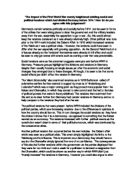An entrenched autocracy. How far do you agree with this judgement of Imperial Germany by 1914?
“An entrenched autocracy.” How far do you agree with this judgement of Imperial Germany by 1914?
To have an ‘entrenched autocracy’ is to have an autocracy (a system of government which allows one person to have absolute rule and power) which is unmoveably deep-set; one which will, for all intents and purposes, never be changed. There are both for and against factors which argue that Wilhelmine Germany was so, including the power that the Kaiser had over the Reichstag and his chancellors, the Kaiser’s own personality and beliefs, the challenges to the Kaiser’s rule and the rise of ‘extremist’ parties such as the Social Democrats. Whilst it cannot be denied that the Kaiser had absolute power and say over Germany, there was always stumbling points, blockades, which stopped him from exercising the ‘self-rule’ which he had always desired.
Because of the constitution which Bismarck, the previous chancellor, had passed, the Kaiser could exercise complete, de jure rule. The Kaiser had the power to hire and fire any member of his ‘inner circle’ which he so chose and that extended to the chancellor; in a 27 year period he had gone through four of them. Constitutionally, the work of Bismarck had meant that there could never be any challenge, short a full-blown revolution, which could disarm or disrupt the Kaisers position. Through recent history, it had become ‘entrenched’ into the minds of the German people and that of the Bundesrat and Reichstag representatives that Wilhelm was there to stay; his say was final and there was little, in real terms, that could be done to halt his power. On the face of it, the Bundesrat was a well spread group of representatives, giving each individual state of Germany a say in constitutional changes. However, because of the dominance of the Kaiser’s ‘home’ state, Prussia, the balance was never truly equal. It only took 14/58 members of the Bundesrat council to veto any legislation that was proposed, and seen as though Prussia held 17/58 seats, it was virtually impossible for anyone outside of Prussia to pass legislation (which wasn’t favoured towards the benefit of the Kaiser.) In conclusion, the best way to analyse the “entrenched power” of the Kaiser would be to compare the power of his rule with that of Britain and Russia. Britain was ruled by democracy (one vote one person), and the King of England had comparatively little say on final legislation passes and proposals to changes in constitutions. However, the Tsar of Russia did have a complete autocracy; even more so that Kaiser Wilhelm, as he didn’t even have a Reichstag or Bundesrat to call on for consultancy, he just did what he wanted, whenever he wanted it. So, whilst the Kaiser did have almost unattainable power, it wasn’t completely absolute, as any proposed legislation could’ve been vetoed by the Bundesrat, and he always had the influence in his ear of his chancellor and his inner party circle.








